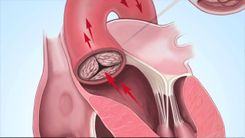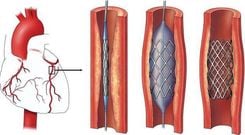This article was consulted by Master of Medicine Doctor Pham Van Hung - Department of Outpatient & Internal Medicine - Vinmec Danang International General Hospital.
All surgeries carry a certain degree of risk, even when all procedures are performed correctly. One common risk is postoperative hypertension. To better understand this condition, please read the following article.
1. What is Postoperative Hypertension?
Patients may experience postoperative hypertension. Whether or not you develop this complication depends on the type of surgery you undergo, the type of anesthesia used, and whether or not you had hypertension before surgery.
Postoperative hypertension is defined as a systolic blood pressure greater than 190 mmHg a diastolic blood pressure greater than 100 mmHg, or both, occurring after surgery. This condition warrants immediate medical attention.
Blood pressure is defined as the force exerted by blood against the walls of your arteries as your heart pumps blood. Blood pressure readings consist of two numbers: systolic (top number) and diastolic (bottom number). For adults, a blood pressure reading of 120/80 mmHg is considered normal.
According to the American Heart Association (AHA), blood pressure readings are categorized into three groups:
- Normal: Less than 120 mmHg systolic and less than 80 mmHg diastolic.
- Elevated: Systolic pressure is between 120-129 mmHg and diastolic pressure is less than 80 mmHg.
- Hypertension: Systolic pressure is greater than 130 mmHg or diastolic pressure is greater than 80 mmHg.
Heart surgery and surgeries involving aortic arteries are at higher risk for postoperative hypertension, especially in individuals with a history of hypertension. If blood pressure is not well controlled before surgery, patients are more likely to experience postoperative hypertension as a complication.
2. Risk Factors for Postoperative Hypertension

Factors contributing to postoperative hypertension include: high body mass index (BMI), age, and the stress level of the surgery. Significant postoperative hypertension can lead to serious complications such as heart failure, arrhythmia, myocardial ischemia, wound bleeding, and cerebral hemorrhage.
3. Causes of Postoperative Hypertension
Postoperative hypertension can be caused by the following causes:
3.1 Medication discontinuation:
If your body is accustomed to blood antihypertensive medications, stopping these medications can cause blood pressure to rebound immediately.
Therefore, it's important to inform your surgeon about this before surgery. Provide detailed information about the medications you're taking and any doses you've missed. Some blood pressure medications can be taken on the morning of surgery, so you don't need to worry too much about missing a dose. Confirm this with your surgeon or anesthesiologist.
3.2 Pain:
Pain can cause your blood pressure to rise above normal levels. However, this is usually temporary. Blood pressure will return to normal after taking pain medication.
3.3 Anesthesia:
The anesthesia process can negatively impact your blood pressure. Experts note that some people's respiratory systems are quite sensitive to breathing tubes, which can stimulate a heart rate and cause temporary hypertension.
Recovery from anesthesia can also cause postoperative hypertension. Factors such as body temperature and the amount of intravenous fluid required during anesthesia and surgery can lead to increased blood pressure.
3.4 Oxygen levels:
When under anesthesia, your body may not receive the necessary amount of oxygen. This leads to a decrease in blood oxygen levels, causing a condition called hypoxemia. As a result, blood pressure increases.
3.5 Pain Medication:
Certain prescription or over-the-counter medications can increase your blood pressure. People with hypertension who use nonsteroidal anti-inflammatory drugs (NSAIDs) may experience side effects that worsen their condition. If you have hypertension, ask your doctor for appropriate options to manage pain before surgery. They may suggest alternative therapies or prescribe different medications.
If you don't have a history of hypertension, any symptoms of postoperative hypertension may be temporary and usually last about 48 hours. Doctors and nurses will monitor your health and use medication to bring your blood pressure back to the ideal range. If you have a history of hypertension, proper blood pressure control will reduce the risk of developing the condition. Additionally, discuss your plans in detail with your doctor before surgery to minimize risks.

To assess your blood pressure and effectively manage it, you should visit a reputable hospital to be referred for necessary diagnostic procedures by a doctor. Vinmec International General Hospital's Basic Hypertension Package and Advanced Hypertension Package are top choices to help you accurately determine your blood pressure status and receive practical advice from doctors to protect your cardiovascular health.
Master of Medicine, Doctor Pham Van Hung has 30 years of experience in examining and treating internal medicine diseases, especially specializing in cardiology: coronary artery disease, heart failure, valvular heart disease, arrhythmias, etc. Master of Medicine, Doctor Hung has held the position of Deputy Head of the Department of Cardiology and Head of the Interventional Cardiology Unit at Da Nang General Hospital and is currently working at the Department of Outpatient and Internal Medicine, Cardiology, and Interventional Cardiology at Vinmec Danang International General Hospital.
To arrange an appointment, please call HOTLINE or make your reservation directly HERE. You may also download the MyVinmec app to schedule appointments faster and manage your reservations more conveniently.















